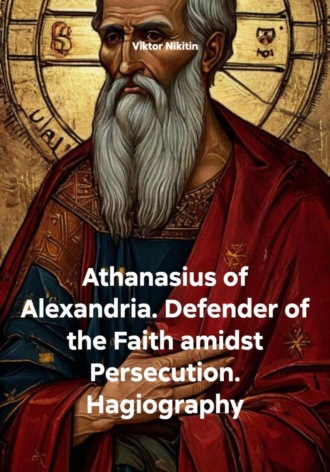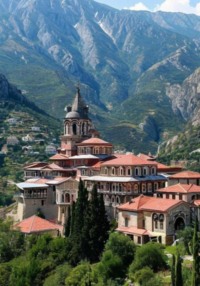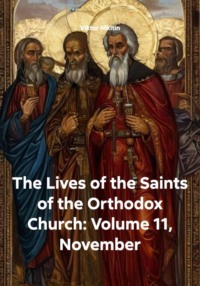
Полная версия
Athanasius of Alexandria. Defender of the Faith amidst Persecution. Hagiography

Viktor Nikitin
Athanasius of Alexandria. Defender of the Faith amidst Persecution. Hagiography
Saint Athanasius the Great, the thirteenth Pope of Alexandria, the fearless guardian of the Nicene faith and the unwavering defender of the mystery of Christ’s Incarnation, was born at the dawn of the fourth century, when the Roman Empire had only recently ceased its persecutions against Christians. Alexandria, his birthplace, was a city unique in the world: a vast crossroads of nations, philosophies, religions, and ambitions. Here stood the great library, here Greek, Jewish, and Egyptian cultures met; here Christian theology had been cultivated by the likes of Origen and Clement. Amid this ferment of ideas and disputes, Athanasius grew up, shaped by the intellectual air of the city and the spiritual atmosphere of the Church newly emerging from the catacombs.
From his earliest years people felt something unusual about him. There was seriousness in his gaze, clarity in his speech, and a calmness that made elders pause. One childhood story, preserved by ancient writers, tells how Athanasius and his companions once, in complete innocence, reenacted Christian baptism while playing near the sea. Patriarch Alexander, watching from above, recognized in the boy’s gestures and words something not childish but deeply sincere. He called the children to him, examined what they had done, and—struck by the earnestness and natural authority of the young Athanasius—took him under his protection. From that moment the life of the future saint unfolded under the watchful eye of one who saw in him the spark of divine calling.
Under Alexander’s guidance Athanasius received an excellent education. He studied Scripture intensely and memorized entire portions by heart. He learned the works of earlier Christian teachers, mastered Greek rhetoric, and even familiarized himself with philosophical debates that animated the lecture halls of Alexandria. Yet more than intellectual brilliance was forming within him: he developed a deep love for the ascetic ideal. Reports of men and women who had left cities for the desert, who lived in silence, fasting, and unceasing prayer, ignited in him admiration. When he was old enough, he sought to meet these men himself.
Thus began his encounters with the Egyptian monks, and among them he found the greatest treasure of his youth: Saint Antony the Great. Antony, already renowned, lived a life of spiritual warfare in the desert. Athanasius, spending time with him, saw sanctity in its purest form. He observed Antony’s humility, his joy, his uncompromising battle against demons, and his love for God that exceeded all earthly ties. Antony, seeing the young man’s zeal, welcomed him, advised him, and blessed him. The friendship between the old hermit and the young deacon would shape much of Athanasius’ later life. His biography of Antony, composed years later, would become one of the most influential Christian works of all time, spreading monasticism throughout the empire.
Athanasius entered the clergy as a deacon and immediately became one of Patriarch Alexander’s closest assistants. The timing could not have been more providential: for it was precisely then that Arius, a priest of Alexandria, began to promote his blasphemous doctrine that the Son of God was not eternal, not divine in the full sense, but a creature—exalted, unique, but still created out of nothing. This teaching threatened the very foundation of Christian faith. If Christ were not God, salvation itself would collapse. If the Son were merely a superior creature, the Incarnation would lose its meaning, and the Church would become no more than a philosophical school.
Patriarch Alexander resisted Arius forcefully, and Athanasius soon became his most brilliant defender. His Against the Gentiles and On the Incarnation, written before he became bishop, already contained the seeds of the theology that would later triumph at Nicaea. His understanding was remarkably clear: the Son is God by nature, co-eternal with the Father, and through Him all things were made. Only if the Word is fully divine can humanity be restored, for only God can deify man.
Meanwhile Arius garnered supporters, especially among influential bishops who valued political stability more than theological precision. The controversy became so great that Emperor Constantine convened the first Ecumenical Council in Nicaea in 325. Athanasius, though only a deacon, played a crucial role. His arguments convinced hesitant bishops, and the Council proclaimed the Son “of one essence with the Father”—a phrase that would echo across the centuries as the cornerstone of Christian orthodoxy. Arius was condemned, but the saint foresaw that the heresy was wounded, not dead.
Patriarch Alexander died shortly after, and despite Athanasius’ attempts to flee the responsibility, the entire Christian population of Alexandria demanded that he be made Patriarch. He accepted with humility, knowing the storms that awaited him. He was barely thirty years old.
Конец ознакомительного фрагмента.
Текст предоставлен ООО «Литрес».
Прочитайте эту книгу целиком, купив полную легальную версию на Литрес.
Безопасно оплатить книгу можно банковской картой Visa, MasterCard, Maestro, со счета мобильного телефона, с платежного терминала, в салоне МТС или Связной, через PayPal, WebMoney, Яндекс.Деньги, QIWI Кошелек, бонусными картами или другим удобным Вам способом.









